Feeling like you’re on a hamster wheel, endlessly spinning through the demands of daily life? There’s a solution older than the modern hustle, rooted in the ancient wisdom of Japanese Zen Buddhism. Enter the Zen garden, a minimalist haven designed to foster tranquillity and cultivate inner peace.
These aren’t your typical flower-filled gardens overflowing with colour. Zen gardens, also known as karesansui, are landscapes of serene simplicity. Think raked sand symbolising rippling water, smooth stones representing mountains, and perhaps a single, meticulously pruned shrub. Each element is carefully arranged, often carrying symbolic meaning that invites contemplation.
Originally created by Zen monks as an aid to meditation, these havens of serenity transcend their origins. Their calming aesthetic and focus on natural elements make them perfect for any space seeking tranquillity. Let the soothing patterns in the sand and the quiet presence of rocks become your visual focus, helping you quiet your mind and reconnect with your inner peace. So, take a break from the daily grind and step into a world of serenity. A Zen garden might just be the key to unlocking your own oasis of calm.
Let’s delve into the core elements that bring a Zen garden to life:
- Foundational Rocks: Large, sculpted rocks or boulders form the backbone of the garden. Carefully positioned, they can symbolise mountains, islands, or guardians of this peaceful space. Beyond beauty, these rocks also retain moisture in the sand, nurturing carefully chosen plants.
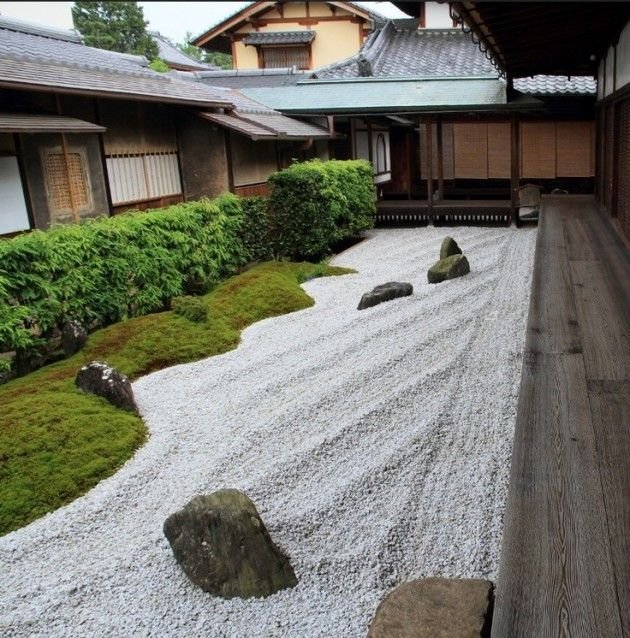
- The Song of Water (Optional): While not every Zen garden boasts water features, the gentle sound of flowing water or the sight of rippling reflections can be incredibly calming. Traditionally, water might be represented by a small pond teeming with water lilies, or perhaps the rippled patterns of meticulously raked sand. A trickling waterfall or a soft murmuring fountain can also add a touch of movement and soften the visual impact of the rocks.

- A Secluded Sanctuary: Peace and privacy are paramount for a Zen garden. Create a hidden haven using walls, fencing, bamboo screening, lattice panels, or formal hedges. Let this space be a refuge from the outside world.
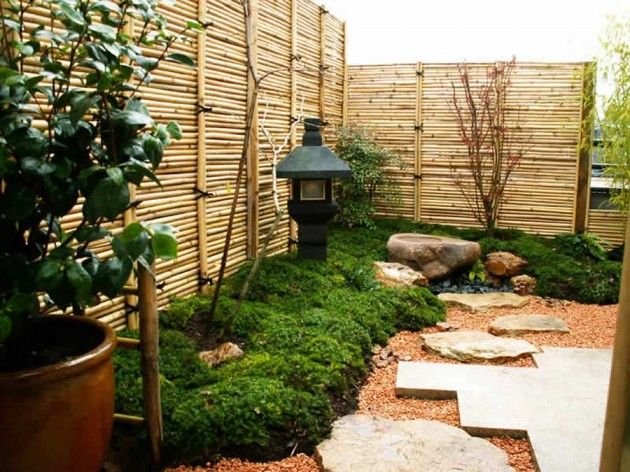
- A Landscape of Symbolism: The very topography of a Zen garden holds meaning. Undulating hills and miniature mountains can represent life’s challenges and obstacles. By incorporating these elements with mounds of sand, the garden acknowledges life’s complexities while offering a space for reflection and overcoming them.
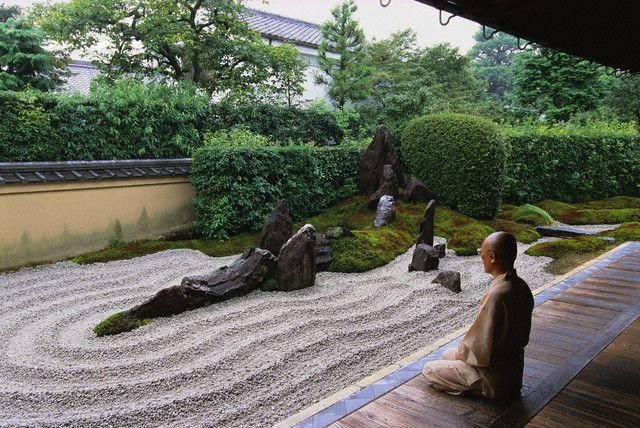
- The Art of Raking: Gravel, raked into patterns, serves both practical and symbolic purposes. The low sun highlights the texture and patterns, creating a dynamic visual. Raking itself can be a meditative practice, fostering focus and concentration. Opt for pea gravel, crushed gravel, or small, smooth pebbles in calming tones like white, cream, or gray.
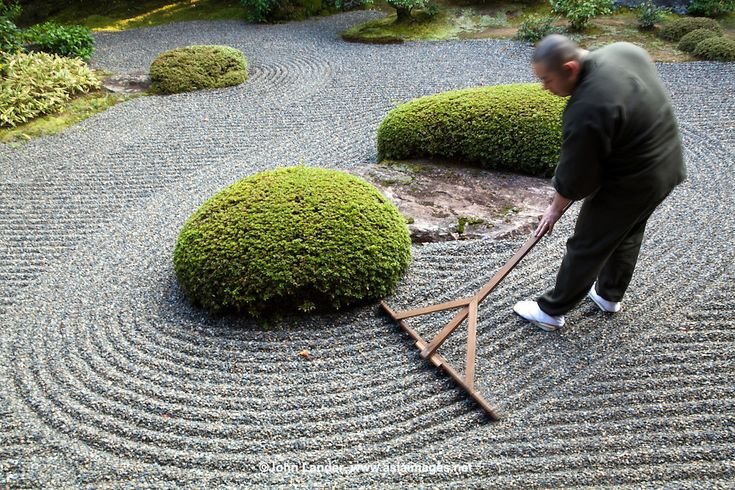
- Winding Pathways: A Zen garden invites exploration along a mindful journey. Smooth, natural stones such as flat stones or finely raked gravel create these paths, contrasting with the larger rocks and gravel around them. These strategically placed stepping stones allow visitors to explore without disturbing the meticulously raked areas, guiding them towards designated meditation spaces and ultimately enhancing the overall experience of peace and tranquillity.
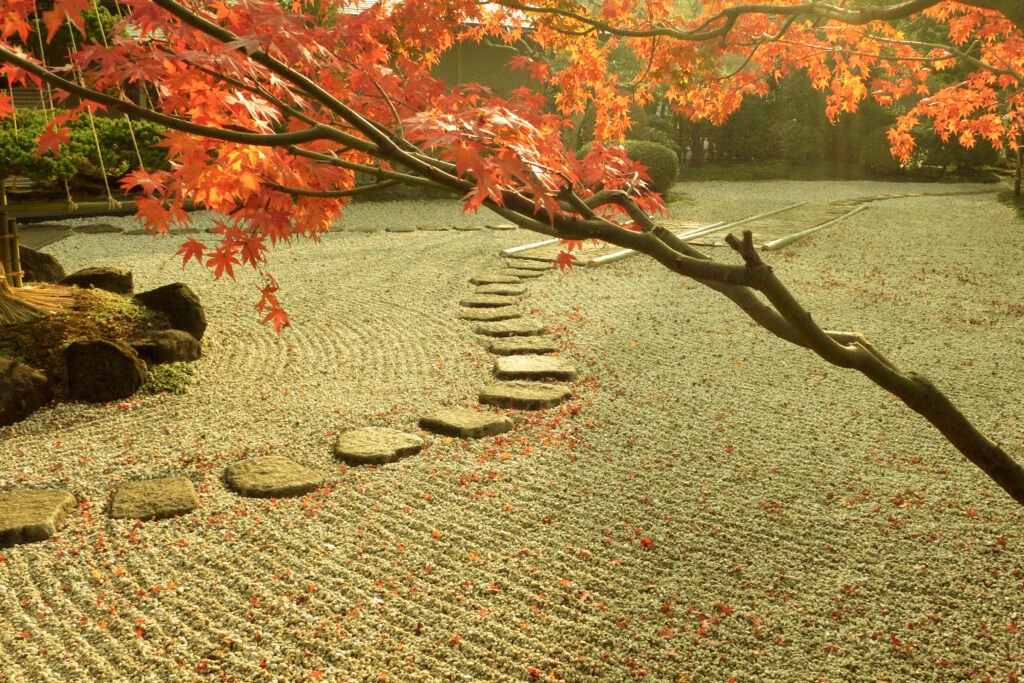
- A Touch of Greenery: While minimalist, a Zen garden isn’t devoid of life. Carefully chosen plants add a breath of life and symbolise harmony with nature. Bamboo, with its tall, straight form, represents strength and spiritual growth. Moss can also be incorporated, evoking a sense of tranquillity and age.
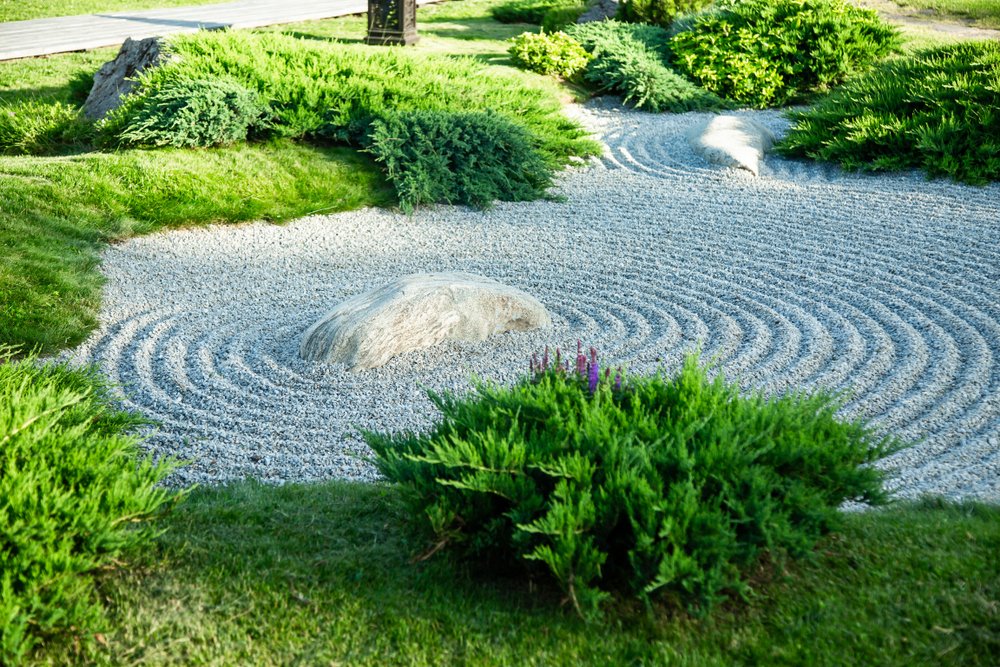
Here’s why Zen Garden is perfect for the UAE
The arid climate of the UAE might seem like an unlikely fit for a Zen garden. However, these minimalist sanctuaries thrive in dry conditions. The focus on rocks, sand, and drought-resistant plants aligns perfectly with the natural landscape of the region. Imagine the calming sound of a trickling water feature (real or symbolic) offering a refreshing contrast to the heat, or the smooth texture of cool stones underfoot. A Zen garden in the UAE becomes a sanctuary not just from the daily grind, but also from the desert heat, offering a cool and peaceful retreat right outside your door.
But the benefits go beyond aesthetics and personal wellbeing. Zen gardens are a sustainable landscaping option for the UAE. Here’s why:
- Low Water Needs: Traditional gardens with water-loving plants can be water-intensive to maintain in the UAE’s arid climate. Zen gardens require minimal water, as they primarily use rocks, sand, and drought-tolerant plants. This reduces pressure on precious water resources.
- Low Maintenance: Zen gardens require less maintenance compared to flower beds or lawns. Raking the sand and occasionally trimming the plants
In conclusion, a Zen garden is more than just an aesthetically pleasing addition to your UAE home. It’s a gateway to tranquillity, a symbol of harmony with nature, and a sustainable landscaping choice. With minimal water needs and low maintenance, a Zen garden allows you to cultivate a haven of peace right outside your door, offering respite from the desert heat and the chaos of daily life. So, consider incorporating this ancient practice into your modern world and find your own oasis of calm amidst the hustle.
